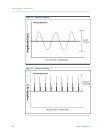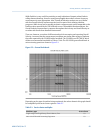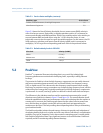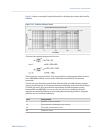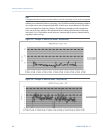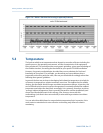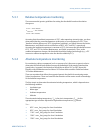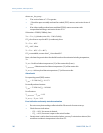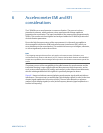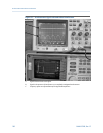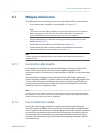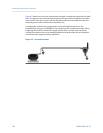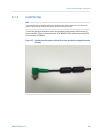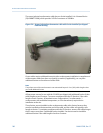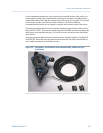
where serv_fact_temp =
• 5 for service factor of 1.15 or greater
• -5 for either open or totally enclosed fan cooled (TEFC) motors, and service factor of
1.0
• 0 for either totally enclosed non-ventilated (TENV) motors or motors with
encapsulated windings, and service factor of 1.0
If elevation > 3300 ft (1000m), then:
T
rise
= T
rise
{1-[(altitude (units of ft) - 3300)/33,000]}
If T
a
is less than or equal to 40°C (or unknown), then:
T
w
= T
rise
+ 40°C
If T
a
> 40°C, then:
T
w
= T
rise
+ 40°C - (Ta - 40°C)
If T
a
is unavailable, assume that T
a
is less than 40°C.
Next, calculate the generic alert thresholds based on the estimated winding temperature,
T
W
.
T
f_fault
= Fault level alarm temperature (°C) of the motor skin (frame)
T
f_maintenance
= Maintenance level alarm temperature (°C) of the motor skin
T
f_advisory
= Advisory level alarm temperature (°C) of the motor skin
Alarm levels
For open drip proof (ODP) motors:
T
f_fault
= 35.5366*Ln(T
w
) - 91.1571
For totally enclosed motors:
T
f_fault
= 37.2028*Ln(T
w
) - 102.8868
For all motors:
T
f_maintenance
= T
f_fault
- 10°C
T
f_advisory
= T
f_fault
- 20°C
Error indication and steady-state determination
• Do not use any data readings collected within 30 seconds of motor start up.
• Check for error indications:
-
If T
f
> 150°C, the sensor is shorted.
-
If T
f
< -40°C, the sensor is open or the wire is broken.
• Steady-state is said to have been reached when, over any 5-minute time interval, the
maximum variation in temperature is less than 2°F.
Velocity, PeakVue, and temperature
100 MHM-97408, Rev 15



